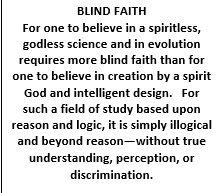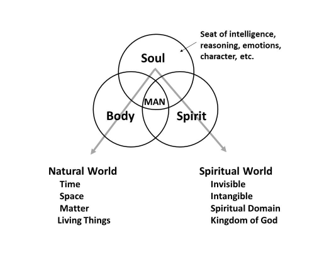For who among men knows the thoughts of man except his own spirit within him? 1 Cor. 2.11
According to Genesis, man had his origin in the Garden of Eden, created by God, and given the “breath” of life. This breath is man’s spirit. In the Hebrew language the word for breath is translated elsewhere as spirit. Using the same word, Proverbs 20.27 reads, “The spirit of man is the lamp of the Lord, searching out his innermost being.” What an important understanding about the spirit of man, clearly showing its intimate connection to God. It is important to know the fundamental makeup of man if we are to understand the nature and function of his spirit, and its vital purpose in opening to man, that is, to you and me, the realm of the Kingdom of God and a relationship with God…who is spirit!
Man is Formed
…”then (on the sixth day) the LORD God formed the man of dust from the ground and breathed into his nostrils the breath of life, and the man became a living being.” Gn. 2.7

Man (Adam), a living being, was created in the image and likeness of God. (See Gn. 1.26-27) Therefore, as God is a triune being consisting of Father, Son, and Holy Spirit, so too man was created as a triune being to reflect the image of the godhead. The vital components of man may be thus interpreted in his creation as body, spirit, and soul, in that order. Of utmost importance is to note, that as our God is one God and not three, but indivisible Father, Son and Holy Spirit, so too man is indivisible body, spirit, and soul. Without the redemption of his body he would be eternally naked being unclothed (see 2 Cor. 5.2-4); without the redemption of his spirit he would be eternally separated from God; and without the redemption of his soul he would be eternally as an infant without spiritual maturity, and in anguish, conscious of his eternal loss.
The Body First
God formed man’s body from the dust of the earth. This body is to be his earthly dwelling place, his habitable tent. (see again 2 Cor. 5.1-4) This is the physical or material part of man. The body is the seat of his five physical senses: sight, hearing, smell, taste, and touch. Having a body, man is able to interact with the world around him. A blind man could hardly see and learn the wonders of the world; or can the deaf man hear and remember the beauty of the song bird or roaring of the waves; nor could a man without the sense of touch feel the warm embrace of a loved one. Man responds to these stimuli with an emotion of like or dislike, attraction or repulsion.
So the body is more than a simple dwelling place for man, it is his vital link to understanding and communing with all of creation. It is the portal through which one communicates with, and interacts with the natural world. He learns to relate to his environment and to live in a relationship with others. Upon death his body is returned to the dust of the earth. However, the need for a body does not end with death. For man to be “man,” according to God’s eternal plan, he needs a body in which to dwell, both now in this present age and in the age to come—for in the age to come there will be a new heaven and new earth, e.g., But in keeping with God’s promise, we are looking forward to a new heaven and a new earth, where righteousness dwells.” 2 Pet. 3.13 Man’s body today, without Christ, is without the hope of its resurrection to life, a life suitable to the new heaven and new earth. This fact brings about the importance of the next component of man, the spirit. God is spirit, the Kingdom of God is spiritual, and “His worshipers must worship Him in spirit and in truth.” Jn. 4.24
The Spirit Next

I worked for many years with a practicing atheist. We would often talk of his beliefs and of mine as well. The greatest stumbling block for him is the realm of the spirit. Simply, though being a professor, he did not believe in the spirit or a spiritual world. Everything, he would say, could be accounted for by natural processes. The scientific method could be used to explain everything. He would staunchly proclaim, “There is no spirit realm or unexplainable phenomena.” Knowledge, he would contend, is yet evolving and even seemingly mysterious events will someday, with the advancement of science, be explained—even matters such as the questionable origin of life, matter and energy. This is blind faith.
Perhaps outnumbering the atheists are the “spiritualists” who practice various forms of mysticism, extra-sensory perception, fortune telling, astrology, psychics, and so on. To these the spirit realm is real. But dabbling in this unseen world of darkness is forbidden by God for they subject man to deception and the powers of a dark world—even as Eve was deceived by Satan. It is written to the Israelites, “When you enter the land that the LORD your God is giving you, do not imitate the detestable ways of the nations there. Let no one be found among you who sacrifices his son or daughter in the fire,practices divination or conjury, interprets omens, practices sorcery, casts spells, consults a medium or familiar spirit, or inquires of the dead. For whoever does these things is detestable to the LORD.” Deut. 18.9-12 Do not be deceived, believers experimenting with this spiritual realm that is outside of the Kingdom of God is a most serious matter subject to the discipline, reprimand and chastisement of the Lord. There are even some practices going on within some “fringe-area” Charismatic/Pentecostal groups that border on such spiritualism.
The Need to be Born Again. Regardless of anyone’s personal beliefs, man was given a spirit as God breathed it into him at creation. With the spirit, the world of the unseen and intangible spiritual domain was opened up to Adam (man). He could perceive “things” of the Kingdom of God and to know God’s presence and communion. The problem being, in what may be phrased, “the fall of man” (see Genesis 3), man (Adam) lost the ability to commune with that part of the spiritual realm known as the Kingdom of God, which includes God Himself. He could still worship God outwardly and from afar with sacrifices, rituals, holy days, and so on, as is the practice of many religions of the world today. And he could still experiment with the forbidden dark domain as described above, but none of that was a suitable substitute for knowing God in spirit and truth.
Regarding the Kingdom of God, the world was thus in darkness. The Kingdom was invisible, intangible, and inaccessible for all generations from the “fall” of man as described in Genesis, until the advent of Jesus Christ and redemption through the cross. The expression “in Christ” is most sobering, powerful, and meaningful. It is sacred and spiritual, and is needful of a full apprehension by the believer. But for now, let us just lay the foundation for belief that anyone “in Christ” is born again of the spirit and the seed of Christ is in him. What an amazingly powerful statement, miraculous, completely outside the natural realm! Once regenerated, we find, “He has rescued us from the dominion of darkness and brought us into the kingdom of His beloved Son.” Col. 1.13 Please note the past tense of the verb phrases, “has rescued us” and “brought us. In other words, the new believer now stands at the threshold of the Kingdom of God having access to fellowship with the living God.
Waiting for some future heaven is now an incidental thought. The believer, with a regenerated spirit, now focuses on this realm made alive, the Kingdom of God, and of drawing near to God…now! For any activity in this dimension, the believer “must be led of the Spirit.”
What has been described here, regarding being in Christ and the new birth, is the basis for interpretation of Jesus’ discussion with Nicodemis, Jesus matter-of-factly told Nicodemis that unless he was born again he could not “see” the Kingdom of God. And, unless he was born again of water and spirit he could not “enter” the Kingdom of God. (See Jn. 3.3,5) One may practice any of the great religions of the world, including Judaism and even “Christianity” as a religious practice, and unless they are born again they remain in spiritual darkness and cannot see, enter into, or perceive of the Kingdom of God in any manner. In such cases one is either dabbling with false spirits or merely outwardly practicing a religion.
Spiritual Senses. As the body of man possesses certain senses enabling him to see and interact with the natural world about him, so too the spirit of man possesses senses that enables him to interact with the spiritual world, the Kingdom of God. To simply attempt to follow what the Bible says about a proper moral life, such as following the Ten Commandments, and of devotion towards God as in Sunday worship and paying tithes, is not necessarily being led of the Spirit. This is more a matter of conscience and of applying one’s intellect and emotions in following the writings of a holy book. It is outwardly practicing religious discipline. This becomes a “religious” practice yet within the natural realm and is not of the spirit. One does not need to be born again to function within this realm.
One must understand the nature of the spirit remembering the primary purpose of the spirit is to relate man to the invisible and intangible spiritual world about him, especially the Kingdom of God for one that has been born again. So, believers cannot rely on their physical senses, emotions, and intellect they have relied upon in the past. It is as the Lord God instructed the Israelites when they began to cross the Jordon and enter the new realm of the promise land. He said for them to keep their eyes upon the Ark of the Covenant before them for “you have never walked this way before.” Jos. 3.5
Observation, perception, and understanding in the realm of the spirit comes from its spiritual senses. Perhaps the greatest of these “spiritual senses,” that I know of and have experienced, are revelation, intuition and discernment. Let us briefly look at these.
Revelation. Revelation happens when one discovers spiritual truth they had not known before. It is the unveiling of a mystery, something hidden to the natural man but is made real and alive to the spiritual man. His spiritual eyes become opened. It becomes an “aha!” moment. “Eureka!” a cry of joy or satisfaction when one finds or discovers something. Regarding such enlightenment, Paul expressed his desire that all may be “filled with the full riches of complete understanding, so that they may know the mystery of God, namely Christ.” Col. 2.2
While the Israelites wondered in the wilderness, they were given manna to eat. Each morning they would go out into the barren land but find this bread-like substance. They could easily see it, touch it, and taste it. Though from heaven, manna was a natural food. But Jesus promised those in the Church of Pergamum who would be overcomers, “I will give the hidden manna.” Rev. 2.17 In other words, there is manna to eat that is not obvious to the physical senses, it is hidden, much like the truths hidden in parables that Jesus would speak to the multitudes. The people could easily comprehend the parable story but they could not understand the underlying mystery. Truth requires revelation. Once Jesus’ disciples urged Him to eat something, to which He replied, “I have food (hidden manna) to eat that you know nothing about.” Jn. 4.32 Jesus lived by spiritual revelation.
Jesus once asked His disciples “who do people say the Son of man is,” to which they replied people likened Him to be one of the prophets. But when Peter replied, “You are the Christ, the Son of the Living God,” Jesus said, “this was not revealed to you by flesh and blood, but by My Father in heaven.” (See Mt. 16.13-17) Revelation of spiritual truth is outside natural observation and reasoning. After His resurrection Jesus walked and spoke with two disciples walking on the road to Emmaus. All the while, for hours in His company, they did not recognize Him in the natural, they were only stirred by His words. Then, in the breaking of bread at meal, suddenly… revelation!…”Then their eyes were opened and they recognized Jesus—and He disappeared from their sight.” Lk. 24.31 In a split second of time, hidden manna was revealed and they ate of it. Not physical manna, of course, but truth that only comes by revelation.
As I scour the words of Scripture, nothing stirs me more that the uncovering of truth—truth not that the world knows by way of academics, but that which is revealed Spirit to spirit. With truth comes proper understanding, and understanding brings life, experiential life of the Kingdom of God.
Intuition. A second spiritual sense is intuition. This is the ability to understand something without the need for conscious reasoning. One just seems to know or consider something likely from instinctive feelings without rational thought and inference. I have often used the expression, “I know that I know” to describe this unexplained feeling that something is true even when I have no tangible evidence or proof of it.
There were times when Jesus went off by Himself to a secluded place for prayer, such as to the Mount of Olives. Then there were times He was led by others before the council of chief priests and scribes for judgment. But then there was a time when “Jesus was led by the Spirit into the wilderness to be tempted by the devil.”Mt. 4.1 This was an intuitive decision by Jesus to go into the wilderness. There was nothing natural or logical about it. He was intuitively led by the Spirit. He simply knew that He knew that He had to go.
The desire to travel afar, even in the name of the Gospel, was absolutely nowhere to be found in me. I was content to fulfill my calling by writing, publishing, and ministering locally. Then one day I was led of the Spirit to India, then again and again to India, and then to Africa. Initially, it was illogical. To me I could reach more to the message of spiritual maturity by writings on my website which is available to all the world. Traveling such as this drains one’s time, energy, and resources to touch but a few souls. But then the response from one of these souls, then another, and yet another, “you have sown a seed in my heart, and it will bring forth fruit.” I then realized what ministry was all about, cultivating and sowing the seed into hearts, even one soul at a time. This seed does not abide alone but brings forth fruit: one thirtyfold, and one sixty, and one a hundred.”Mk. 4.20 Life is in the seed, and to sow the seed in one heart is worth any sacrifice.
Discernment. What appears to be good and wholesome and right is not always so. Appearances of things and people can be deceiving. Even Eve, our first parents, lacked the spiritual sense of discernment: “When the woman saw that the (forbidden) tree was good for food and pleasing to the eyes, and that it was desirable for obtaining wisdom, she took the fruit and ate it.” And Adam thought it was a right thing to do and ate of it as well. Gn. 3.6 In its simplest definition, discernment is the ability to judge between truth and error, right and wrong. Discernment is the inward sense making careful distinctions in our thinking about truth. This includes judging matters such as doctrine, character, morals, worship, “spiritual” practices and the inward sense of doing something seemingly harmless is right or wrong. The believer must take care to pray for, and develop this “sense” of spiritual discernment. This is why the psalmist prayed, “Teach me good judgment and knowledge…” Ps. 119.66
The writer of Hebrews equates the lack of discernment with spiritual immaturity. He writes,
“We have much to say about this, but it is hard to explain, because you are dull of hearing. Although by this time you ought to be teachers, you need someone to reteach you the basic principles of God’s word. You need milk, not solid food!
For everyone who lives on milk is still an infant, inexperienced in the message of righteousness. But solid food is for the mature, who by constant use have trained their senses to distinguish (discern) good from evil.” Heb. 5.11-14
Having their senses – We are most familiar with this term to mean see, smell, taste, etc. But here it means “the inner sense,” the faculty of perceiving truth. The meaning is, as they continue to grow in understanding new and elevated doctrines, the exercise of their spiritual senses becomes sharper in distinguishing truth from error. The good and evil they are to discern here is in doctrine; they will embrace what is true and reject what is false. A great fear in the apostle Paul was that those of this newly formed church will lack proper discernment and eventually embrace error:
“I am afraid, however, that just as Eve was deceived by the serpent’s cunning, your minds may be led astray from your simple and pure devotion to Christ. For if someone comes and proclaims a Jesus other than the One we proclaimed, or if you receive a different spirit than the One you received, or a different gospel than the one you accepted, you put up with it way too easily.” 2 Cor. 11.3-4
Another of the great exercises of this sense of discernment is towards character, the true nature of an individual. The wolf comes in sheep’s clothing, meaning the true character of an individual is hidden behind his personality. Outwardly they appear most gracious, sincere, compatible, and full of understanding but within they have their own agenda, secretive, narcissists, controlling, hiddenly immoral and/or perverted in truth. Both apostles Paul and John warned of such individuals.
“Even from your own number, men will rise up and distort the truth to draw away disciples after them. Therefore be alert…” Acts 20.3-4, and,
“Children, it is the last hour; and just as you have heard that the antichrist is coming, so now many antichrists have appeared. This is how we know it is the last hour. They went out from us, but they did not belong to us.” 1 Jn. 2.18-19
The Church as a whole today greatly lacks discernment: having itching ears wanting to hear something new, exciting, powerful or do something to fill their own desires; impatient, feeling the need to act quickly; little time spent in prayer and thought; and just using their natural logic and/or reasoning powers, physical senses, and emotions to decide a situation. May God awaken the Church and Paul’s prayer of Ephesians 1.15-21 finds its fulfillment in the hearts of believers.
And Finally: The Soul

When God breathed (the spirit) into the body of man he became a living being, a soul. This is the seat of his ego, who he is. It is his nature, his intelligence, his memory, his character, and all his desires and fears. This is who he is and who you are. And, the way you become who you are largely depends on the way you (your soul) interacts with the natural world through your body and the spiritual world through your spirit.
Someone who may be described as carnal or fleshly is mainly focused on the natural world and satisfying the soul’s “self” desires for happiness, health, success, longevity, safety, and all those things that bring comfort and security into one’s life. Even religion and the Bible may be used for such reasons. Many are not as interested in the heart of God for their lives today as they are focused on blessings for the present and for their eternal destiny (heaven or hell) in the age to come. This is simply the nature of the soul. The soul, ego, tends to be “I” centered—“ego-centric.”
However, for the spiritual man, “…solid food is for the mature, who by constant use have trained their senses to distinguish (discern) good from evil.” Heb. 5.14 They have sharpened their spiritual senses of revelation, intuition, and discernment to interact in the spiritual domain of the Kingdom of God. This brings a new perspective into the soul. They see “reality” with new eyes. Their understanding of truth is enlarged to include the reality of the Kingdom of God, and that of a living relationship with God the Father and Lord Jesus Christ in the Spirit. They become convinced of their new spiritual purpose in life and of their calling of God. Their hearts are set about to satisfy the heart of their Father and Lord Jesus Christ, for now they see and understand that:
“Therefore, since you have been raised with Christ, strive for the things above, where Christ is seated at the right hand of God. Set your minds on things above, not on earthly things. For you died, and your life is now hidden with Christ in God. When Christ, who is your life, appears, then you also will appear with Him in glory.” Col. 3.1-4
It is in this realm that the soul is transformed and matures in stature.
Spiritual Senses and the Body of Christ
I believe the urging is for each and every believer to develop his or her spiritual senses. It takes much focused time and prayer to do so. Patience and persistence are needed virtues. Even though each individual develops some measure of these senses, there are, in the Body of Christ, those that have a greater measure of revelation, intuition, and discernment. These are to be used much as the gifts of the Spirit in the guidance and edification of the Church. They help to sniff out wolves in the midst, discern doctrinal errors, set spiritual goals, uncover hidden sin and wickedness, identify subtle demonic activity and unhealthy spiritual practices. It is my contention that this walk into the Kingdom of God is a corporate walk, and not to be done alone or in small sects. We need the full working of the Body of Christ in various ministries, gifts of the Spirit, and spiritual senses for the building up and preparation of the Church in the earth.




